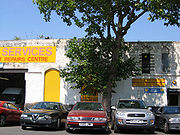
Camberwell railway station
Encyclopedia

London, Chatham and Dover Railway
The London, Chatham and Dover Railway was a railway company in south-eastern England from 1859 until the 1923 grouping which united it with other companies to form the Southern Railway. Its lines ran through London and northern and eastern Kent to form a significant part of the Greater London...
(LC&DR). It opened in 1862 as part of the company's ambitious second London railway. In 1863 the name was changed to Camberwell New Road but in 1908 reverted to Camberwell. As with many other London stations wartime restraints forced it to close in 1916.
The station was mentioned in the 1956 film Private's Progress
Private's Progress
Private's Progress is a 1956 British comedy film based on the novel by Alan Hackney. It was directed and produced by John and Roy Boulting, from a script by John Boulting and Frank Harvey.-Plot:...
as a good place to get off a train and avoid paying a fare. It was made to sound like a working station, despite the fact that it had closed nearly thirty years before the film was set.
Today Camberwell Station Road still survives where the original station building has been converted to a garage. At track level fragments of the platforms can be seen from passing trains.

